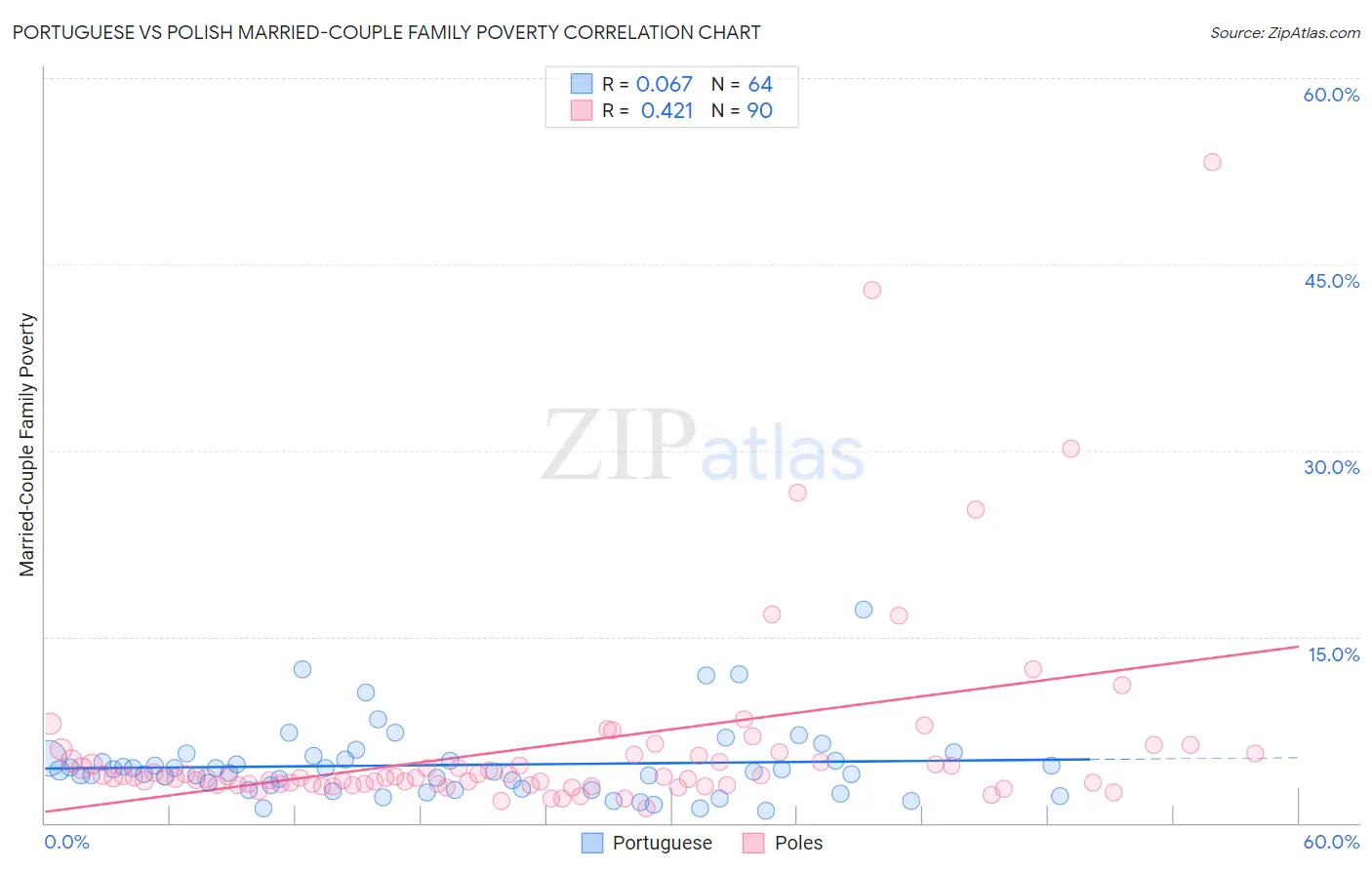Portuguese vs Polish Married-Couple Family Poverty
COMPARE
Portuguese
Polish
Married-Couple Family Poverty
Married-Couple Family Poverty Comparison
Portuguese
Poles
4.6%
MARRIED-COUPLE FAMILY POVERTY
98.3/ 100
METRIC RATING
95th/ 347
METRIC RANK
4.0%
MARRIED-COUPLE FAMILY POVERTY
100.0/ 100
METRIC RATING
15th/ 347
METRIC RANK
Portuguese vs Polish Married-Couple Family Poverty Correlation Chart
The statistical analysis conducted on geographies consisting of 444,135,508 people shows a slight positive correlation between the proportion of Portuguese and poverty level among married-couple families in the United States with a correlation coefficient (R) of 0.067 and weighted average of 4.6%. Similarly, the statistical analysis conducted on geographies consisting of 546,544,798 people shows a moderate positive correlation between the proportion of Poles and poverty level among married-couple families in the United States with a correlation coefficient (R) of 0.421 and weighted average of 4.0%, a difference of 14.4%.

Married-Couple Family Poverty Correlation Summary
| Measurement | Portuguese | Polish |
| Minimum | 0.98% | 1.1% |
| Maximum | 17.2% | 53.2% |
| Range | 16.2% | 52.1% |
| Mean | 4.7% | 6.2% |
| Median | 4.2% | 3.7% |
| Interquartile 25% (IQ1) | 2.7% | 3.1% |
| Interquartile 75% (IQ3) | 5.2% | 5.4% |
| Interquartile Range (IQR) | 2.5% | 2.3% |
| Standard Deviation (Sample) | 2.9% | 8.1% |
| Standard Deviation (Population) | 2.9% | 8.0% |
Similar Demographics by Married-Couple Family Poverty
Demographics Similar to Portuguese by Married-Couple Family Poverty
In terms of married-couple family poverty, the demographic groups most similar to Portuguese are Immigrants from Italy (4.6%, a difference of 0.040%), Immigrants from Poland (4.6%, a difference of 0.080%), Korean (4.6%, a difference of 0.090%), Immigrants from Belgium (4.6%, a difference of 0.13%), and Immigrants from Norway (4.6%, a difference of 0.27%).
| Demographics | Rating | Rank | Married-Couple Family Poverty |
| Bolivians | 98.6 /100 | #88 | Exceptional 4.6% |
| Immigrants | Czechoslovakia | 98.5 /100 | #89 | Exceptional 4.6% |
| Immigrants | Switzerland | 98.5 /100 | #90 | Exceptional 4.6% |
| Basques | 98.5 /100 | #91 | Exceptional 4.6% |
| Immigrants | Norway | 98.4 /100 | #92 | Exceptional 4.6% |
| Koreans | 98.3 /100 | #93 | Exceptional 4.6% |
| Immigrants | Italy | 98.3 /100 | #94 | Exceptional 4.6% |
| Portuguese | 98.3 /100 | #95 | Exceptional 4.6% |
| Immigrants | Poland | 98.3 /100 | #96 | Exceptional 4.6% |
| Immigrants | Belgium | 98.2 /100 | #97 | Exceptional 4.6% |
| Native Hawaiians | 98.0 /100 | #98 | Exceptional 4.6% |
| Immigrants | Europe | 97.9 /100 | #99 | Exceptional 4.6% |
| Immigrants | Western Europe | 97.9 /100 | #100 | Exceptional 4.6% |
| Yugoslavians | 97.8 /100 | #101 | Exceptional 4.6% |
| Asians | 97.6 /100 | #102 | Exceptional 4.7% |
Demographics Similar to Poles by Married-Couple Family Poverty
In terms of married-couple family poverty, the demographic groups most similar to Poles are Slovak (4.0%, a difference of 0.030%), Czech (4.0%, a difference of 0.070%), German (4.0%, a difference of 0.27%), Filipino (4.0%, a difference of 0.30%), and Italian (4.0%, a difference of 0.31%).
| Demographics | Rating | Rank | Married-Couple Family Poverty |
| Thais | 100.0 /100 | #8 | Exceptional 3.9% |
| Croatians | 100.0 /100 | #9 | Exceptional 3.9% |
| Carpatho Rusyns | 100.0 /100 | #10 | Exceptional 3.9% |
| Lithuanians | 100.0 /100 | #11 | Exceptional 4.0% |
| Bulgarians | 100.0 /100 | #12 | Exceptional 4.0% |
| Czechs | 100.0 /100 | #13 | Exceptional 4.0% |
| Slovaks | 100.0 /100 | #14 | Exceptional 4.0% |
| Poles | 100.0 /100 | #15 | Exceptional 4.0% |
| Germans | 100.0 /100 | #16 | Exceptional 4.0% |
| Filipinos | 100.0 /100 | #17 | Exceptional 4.0% |
| Italians | 100.0 /100 | #18 | Exceptional 4.0% |
| Immigrants | Ireland | 99.9 /100 | #19 | Exceptional 4.1% |
| Maltese | 99.9 /100 | #20 | Exceptional 4.1% |
| Zimbabweans | 99.9 /100 | #21 | Exceptional 4.1% |
| Immigrants | Singapore | 99.9 /100 | #22 | Exceptional 4.1% |